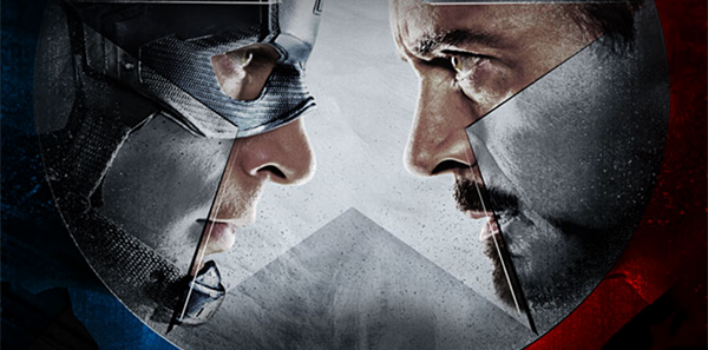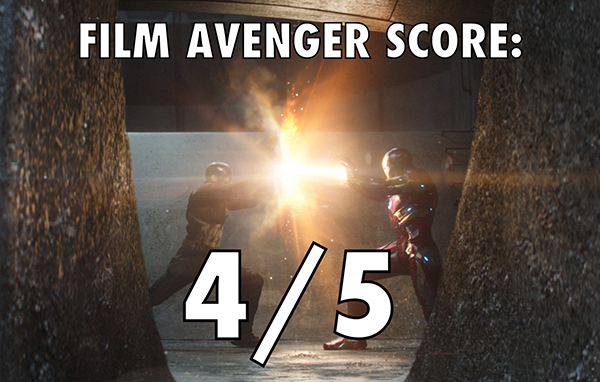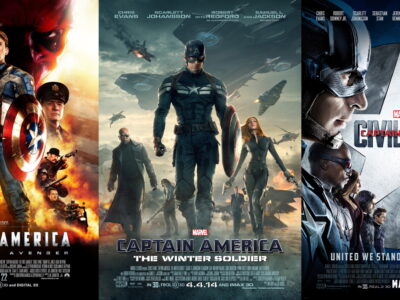Review| ‘Captain America: Civil War’ – What is an Avenger?
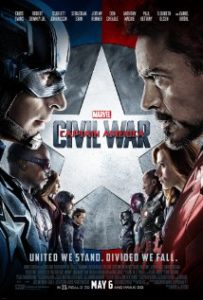 Captain America: Civil War is one powerful movie. It is an awesome experience, jam-packed with what seems to be every Marvel geek’s fantasy. Cap, Black Widow, Iron Man, Black Panther, Spider-Man (SPIDER-MAN!!) – they’re all here. My mind constantly went back to my ten-year-old self, playing with superhero action figures and pitting them against each other.
Captain America: Civil War is one powerful movie. It is an awesome experience, jam-packed with what seems to be every Marvel geek’s fantasy. Cap, Black Widow, Iron Man, Black Panther, Spider-Man (SPIDER-MAN!!) – they’re all here. My mind constantly went back to my ten-year-old self, playing with superhero action figures and pitting them against each other.
Did it have the same dramatic weight and action polish as the perennially brilliant Captain America: The Winter Soldier (which Civil War directors Anthony and Joe Russo also helmed)? No. But it is still very entertaining, and now holds the number three spot on my top Marvel movie list.
Some wonder why this wasn’t considered just another Avengers movie. The Captain America title is definitely apt, though. Cap is the central character, and the film’s scope lacks the epic quality of the two previous Avengers films directed by Joss Whedon – and that is no doubt by design. What the Russos and scribes Christopher Markus and Stephen McFeely have crafted is a small-scale film about an epic “family feud.” It is the culmination of a rift that has been felt between Captain America and Iron Man since they first met in The Avengers.
Civil War is one of the Marvel Cinematic Universe’s most ideologically and thematically heavy films. It doesn’t have a James Spader-voiced robot waxing philosophically; it’s definitely more subtle. There are two very big ideas at play. The first is a question of government regulation, and its effectiveness at preventing collateral damage. The larger idea, however, is a spiritual one, and it drives almost all the central combatants in this story.
SPOILERS AHEAD
Stuff I Liked
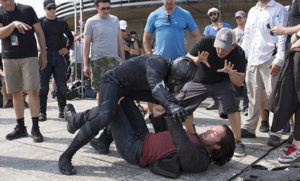 The Russo Brothers follow up their excellent feature debut Captain America: The Winter Soldier with another exciting, action-packed film. Like Winter Soldier, Civil War has a raw, realistic look with action that never seems to stop, only using CGI when absolutely necessary (more or less). The brothers’ greatest filmmaking strengths are that they know how to give the audience time to breathe between action sequences, and they never forget that the characters are more important than the action taking place.
The Russo Brothers follow up their excellent feature debut Captain America: The Winter Soldier with another exciting, action-packed film. Like Winter Soldier, Civil War has a raw, realistic look with action that never seems to stop, only using CGI when absolutely necessary (more or less). The brothers’ greatest filmmaking strengths are that they know how to give the audience time to breathe between action sequences, and they never forget that the characters are more important than the action taking place.
With this many characters onscreen at once, it would be easy for some of them to fall into the background. But the Russos have taken a page from Joss Whedon’s playbook and have given all the characters a chance to shine. The difference between the Russos and Whedon, however, is that the characters are more intact personality-wise from their stand-alone films. Ant-Man is a fine example. A director could have changed the character, making him more serious. But the filmmakers went with his previous personality and made it fit. Paul Rudd’s Scott Lang ended up being one of the funniest parts of the movie for me.
The epic battle of heroes was staged beautifully; none of the characters got lost in the fray. Careful attention was paid to show that these characters did not want to hurt one another, which I found endearing and enabled me to feel sympathy for both sides.
Speaking of the battle, I have to tip my hat to the Russos for one specific thing about that sequence: the wonderful physics of Giant-Man. In many movies, something as large as Giant-Man would move with the quickness of someone normal-sized. It’s an annoyance that puts me out of so many movies. Giant-Man’s scale is spot on, and it’s so refreshing. Not since the newest Godzilla film have I been this satisfied with scale and movement in a movie.
The troika of Cap, Bucky, and Sam Wilson was such a joy to watch. Sam and Bucky are the “new” and “old” friend to Cap respectively, and jab at each other as part of a friendly, almost schoolboy-type, rivalry.There were many great scenes between the three of them. My favorite was when Cap kissed Sharon Carter. He looked over to the car and saw Bucky and Sam smirking and nodding in approval. The timing was done for maximum comedic effect, and it worked.
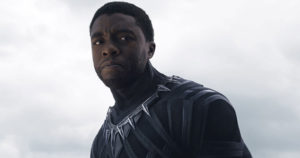 Welcome home, Spider-Man! It’s so good to see everyone’s favorite web-slinger back where he belongs, among his fellow Marvel heroes. Tom Holland is a wonderful Peter Parker – quite possibly the best cinematic iteration of the character, in my opinion. He’s geeky, reserved, but bold and quick-witted when in costume. Peter is hilarious in his awkwardness, acting like the kid he is around these awesome superheroes. And he has some of the best lines in the entire film.
Welcome home, Spider-Man! It’s so good to see everyone’s favorite web-slinger back where he belongs, among his fellow Marvel heroes. Tom Holland is a wonderful Peter Parker – quite possibly the best cinematic iteration of the character, in my opinion. He’s geeky, reserved, but bold and quick-witted when in costume. Peter is hilarious in his awkwardness, acting like the kid he is around these awesome superheroes. And he has some of the best lines in the entire film.
T’Challa, expertly played by Chadwick Boseman, also makes his MCU debut in this film and, like Spider-Man, is another wonderful character addition. Boseman plays the Black Panther with an air of regal professionalism. But there is something else going on in his eyes – an intensity behind the pomp. He speaks with power and authority. The Black Panther suit is also amazing. It could have looked silly, but there is a majesty in the design.
Not to be outdone by the heroes, Zemo is not the typical, one-dimensional Marvel villain. I almost dismissed him as such until I read Matt Goldberg at Collider and his take on Zemo. He is not a bombastic blowhard bent on world domination/destruction (Malekith, Red Skull) or a corporate jerk seeking to only make a buck (Darren Cross, Obediah Stane). Zemo has nuance, realized by Daniel Bruhl’s subdued performance. He’s a somewhat sympathetic character that exists as an extension of the thematic ideas, but more on that later.
Stuff I Didn’t Like
If you’ve been following my movie reviews, you know that I have a special disdain for shaky-cam. It’s used far too much in film today. For all their expertise and harkening back to the “old way” of filming action scenes, the Russos have definitely fallen into that horrible trend. Shaky-cam is used to enhance the visual chaos of a scene; it shouldn’t provide additional moves or remain in scenes where it isn’t required.
The most egregious shaky-cam offense in Civil War was the entire opening sequence. So much in fact, that it was sometimes difficult to tell what was going on. It was almost comical how the camera jerked with some of the punches and kicks thrown. Part of what made Winter Soldier so enjoyable visually was the sparing use of shaky-cam, using more still cameras for orienting shots, additional coverage and jump-cuts.
Another peculiar storytelling choice was the huge text that established the location of a scene. It was very off-putting and I didn’t understand why it was so large. It was as if the picture was silently screaming the location, just to make sure we were aware of it. This looks to be borrowed from Danny Boyle’s Steve Jobs biopic, and it was just as bizarre.
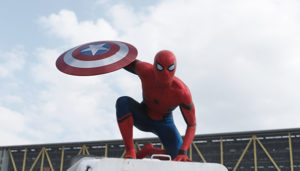 As much as I adored this new, amazing take on Spider-Man, I did have some reservations. He seemed tacked-on to the story, which is probably because the deal between Marvel and Sony for use of the character was reached during production. His intro felt rushed and was given very little context. As much as we all probably know the origin story, and have seen it in all the previous cinematic versions, it would have been nice to at least have a little nod to the backstory (he looks longingly at a photo of Uncle Ben, he recites the “with great power” mantra, something like that).
As much as I adored this new, amazing take on Spider-Man, I did have some reservations. He seemed tacked-on to the story, which is probably because the deal between Marvel and Sony for use of the character was reached during production. His intro felt rushed and was given very little context. As much as we all probably know the origin story, and have seen it in all the previous cinematic versions, it would have been nice to at least have a little nod to the backstory (he looks longingly at a photo of Uncle Ben, he recites the “with great power” mantra, something like that).
Though I liked the design of the Spider-Man costume, it looked terribly CGIed. This was some of the most glaringly obvious CGI work I’ve seen in a Marvel film. I could only tell that Holland was actually in the costume in a couple of shots. It was very disappointing. The narrowing eyes didn’t help the situation. He looked too cartoony to be real.
Like Spider-Man, T’Challa needed more time on screen. I think Markus and McFeely wrote for the Marvel fans who already know who Black Panther is. There isn’t very much backstory or explanation given about his powers or his vibranium-enhanced suit. This is not typical of Marvel protagonists, who are often given lengthy backstories or little tidbits of backstory at the very least.
Stuff to Ponder
 I must admit that it took me a while after seeing Captain America: Civil War to really pinpoint exactly what I wanted to highlight thematically in this review. The film has a lot of substance, not all of it surface-level. This is indeed the film’s greatest strength, and where it matches The Winter Soldier most in terms of storytelling quality.
I must admit that it took me a while after seeing Captain America: Civil War to really pinpoint exactly what I wanted to highlight thematically in this review. The film has a lot of substance, not all of it surface-level. This is indeed the film’s greatest strength, and where it matches The Winter Soldier most in terms of storytelling quality.
Civil War is one of the most politically-charged Marvel films up to this point. The heroes are divided over resistance to government oversight in the form of the Sokovia Accords. As in reality, the world is trying to use government bureaucracy to find a “perfect,” cookie-cutter solution for a problem, and possibly making the situation worse.
Good points are made on both sides, but I believe that Cap is in the right. His argument is that the United Nations committee chosen to oversee the Avengers will have their own agendas, and those agendas may not be in line with the Avengers’ values of protecting innocent people from extraordinary foes. He poses the questions, “what if they send us somewhere we don’t think we should go? What if we should go somewhere, and they don’t let us?”
Cap reflects the reality of the situation on the ground: the Avengers aren’t perfect, but they help where they can. As much as they want to, they can’t save everyone. They’re still human despite their enhanced abilities.
The individuals on the Avengers team should be able to choose who they help and where, and not have to get permission from some governing body made up of imperfect people who may have conflicting agendas. Government committees are notorious for being slow to act in a crisis – the UN especially. And by the time the bureaucrats decide to do something, it might be too late (as we saw with the real-life events in Rwanada in 1994 and Benghazi in 2012).
It is particularly sad (though not entirely surprising) that after all the times that Cap and the Avengers have saved the world, the collective world governments still do not trust them. The Avengers have proven over and over again that they try so hard to minimize civilian casualties. Yet, all the bureaucrats do is complain about the destruction in the aftermath of a battle. One has to wonder if there isn’t a hint of jealousy among the governments of the world that a handful of super-powered private citizens could do what a governing body can’t or won’t.
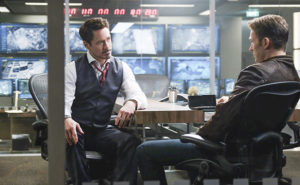 It’s ironic that the UN thinks that they have the moral high ground on this situation, considering that the World Security Council was more than willing to drop a nuclear weapon on lower Manhattan to stop Loki and his army of Chitauri in the first Avengers film, potentially killing millions in the process. In that instance, Tony Stark prevented the government from making a huge mistake. That event should be seared in Tony Stark’s memory, and should have set off a red flag in Tony’s mind when faced with the Sokovia Accords.
It’s ironic that the UN thinks that they have the moral high ground on this situation, considering that the World Security Council was more than willing to drop a nuclear weapon on lower Manhattan to stop Loki and his army of Chitauri in the first Avengers film, potentially killing millions in the process. In that instance, Tony Stark prevented the government from making a huge mistake. That event should be seared in Tony Stark’s memory, and should have set off a red flag in Tony’s mind when faced with the Sokovia Accords.
Unfortunately, Stark could not see that because he’s a man who has been shaken to his core by past events. He wants an out from being Iron Man, and has for a while. Tony created Ultron to solve the problem and ended up making things worse. He loves being the hero, but wanted the responsibility and the guilt that comes with it taken off his hands so that he can feel better about himself. In some ways, that makes him a moral coward.
“Who is going to avenge my son?”
That question was spoken to Stark at the beginning of Civil War by Miriam Sharpe, a woman who lost her son during the events of Avengers: Age of Ultron. Sharpe obviously blames Tony for her son’s death, but that one line speaks volumes to the second, larger point of the film. Sharpe wasn’t looking for justice, but vengeance. One could see the hurt and hate in her eyes.
Revenge also drives Zemo’s motives, which is what makes him a more compelling villain as Marvel villains go. He is a man in pain and blames the Avengers for it, much like Miriam Sharpe. Zemo doesn’t want world domination or destruction, as demonstrated by his murder of all of the other Winter Soldiers (a brilliant misdirect that built upon the audience’s preconceived notions of past Marvel villains). He just wants revenge on the Avengers, period. It’s a small-scale plan with more internal consequences.
And to a degree, Zemo succeeds – another interesting break from the typical Marvel villain. The Avengers are broken by the end of the film, and relationships are frayed on all sides. That is why, when asked by government lackey Everett Ross how it feels to lose because he was captured, Zemo replies, “Did I?” Zemo hit the heroes where it hurt emotionally. Much like a certain spiritual enemy does, he tapped into their weak points to cloud their judgement and make them do terrible things to each other.
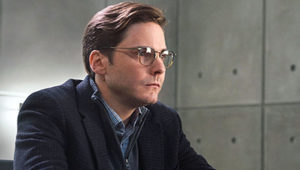 Part of Zemo’s plan was to get some of the heroes boiling with vengeance, making their fleshly satisfaction for revenge consume their noble nature and hard-forged friendships. Both T’Challa and Tony Stark become ensnared in a web of revenge, with a desire to kill the one that supposedly wronged them trumping everything else.
Part of Zemo’s plan was to get some of the heroes boiling with vengeance, making their fleshly satisfaction for revenge consume their noble nature and hard-forged friendships. Both T’Challa and Tony Stark become ensnared in a web of revenge, with a desire to kill the one that supposedly wronged them trumping everything else.
It is unfortunate that revenge is a desire that so many people have. It is often confused with justice and righteousness. But in the end, revenge is simply about making oneself feel better about a perceived wrong. It is an emotion-driven state that seems to overpower people.
We see it in the news and culture constantly. Whenever something horrible happens, such as the shooting of a black man by a white police officer, people so often make the jump to vengeance and retribution without looking at other extenuating circumstances. Politicians promise economic revenge against rich people for supposedly “stealing” their wealth. And many movies are revenge fantasies, with the hero taking particular delight in vanquishing their foe.
“Do not take revenge, my dear friends, but leave room for God’s wrath, for it is written, ‘It is Mine to avenge; I will repay,’ says the Lord…” -Romans 12:19
It’s very poignant that the group of superheroes at the center of this film are called “Avengers.” It is clear from the success of superhero films generally that people have an innate desire for justice – to see someone come and right the wrongs, punish the evildoers and restore order. But people so often confuse righteousness and justice with vengeance.
Vengeance is not ours to take. We are imperfect beings and therefore cannot enact perfect justice. Only God is fit to judge those who sin, as He is the supreme Judge and Lawgiver. One could say that He is the ultimate Avenger.
T’Challa: “Vengeance has consumed you. It has consumed them. I won’t let it consume me.”
At the end of the film, T’Challa breaks the cycle of revenge by not only letting go of his desire to kill Zemo, but preventing Zemo from taking his own life after his “mission” of vengeance was complete. T’Challa realized that there is no satisfaction in revenge. It will not bring his father back, and he will be left with blood on his own hands. In the case of Tony, it is possible that he will never be able to forgive Bucky for what he did. But based on Tony’s reaction to Cap’s letter, there may still be hope.
So What I’m Trying to Say is
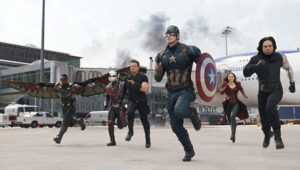 Captain America: Civil War is a mostly brilliant and surprisingly dense film with outstanding action and wonderful character development. Regardless of a few questionable filming choices, the Russo Brothers have created another solid moviegoing experience. I have no doubt that they will be able to handle the upcoming Avengers: Infinity War films, and it makes me quite excited to see what they come up with.
Captain America: Civil War is a mostly brilliant and surprisingly dense film with outstanding action and wonderful character development. Regardless of a few questionable filming choices, the Russo Brothers have created another solid moviegoing experience. I have no doubt that they will be able to handle the upcoming Avengers: Infinity War films, and it makes me quite excited to see what they come up with.
The thematic points posed by the film are both political and spiritual. While the question of the effectiveness of government intervention can be debated back and forth, with both sides making good points, I believe Captain America’s approach makes the most sense, given the situations he and his team have faced. However, there is no doubt on where we should stand on the concept of revenge. Like all sin, revenge may be satisfying in the moment, but has far-reaching consequences on our spirit and our relationship with our Creator.
The quest for revenge is never-ending, and will only lead to destruction. Let God be your Avenger.


